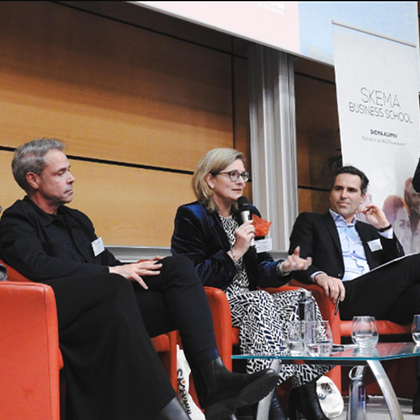News
How has management now become a "major art form"?
Imagem
Over 70 alumni and corporate partners attended the "Managing in the 21st Century: A Major Art Form" round-table held at SKEMA Lille on 14 November! This event, organised jointly with the Corporate Department, focused on the theme of SKEMA Business Hub's "Regards croisés" report analysing the challenges of management in a world in transition(s).
After a keynote by Fabien Seraidarian, Vice-Dean of Research and Director of SKEMA Business School’s Global Executive MBA programmes, our four guest speakers — Kate Chemière (SKEMA 1991), Head of Executive HR Projects at Groupe Crédit Agricole; Sylvie Fouillouse de Paris (SKEMA 1988), former head of HR at GL Events and now in the process of setting up her own company; Joannes Soënen (SKEMA 1992), CEO of Jules; and Julien Barrois, Managing Director Michael Page Lille — were able to share their respective backgrounds and experience on this subject.
Managing in a chaotic context
Fabien Seraidarian began by presenting management as a major art form in this "chaotic" context. There were three key parts to his presentation:
- The manager and the challenge of transformation
- The emergence of new managerial figures
- Towards the advent of the managerial function
New forms of management
This presentation gave our guest speakers some food for thought and fuelled a fascinating debate. Different points of view intersected:
- Sylvie Fouillouse de Paris pointed out that there is a prerequisite for management; that for everything to work, there needs to be a clear company vision and the company’s speed must be adapted to employees.
- Julien Barrois questioned the notion of Art. In his view, managers have been training themselves by mimicry for decades, and this no longer fits with today's evolving expectations. A new mindset has taken hold in business and society.
- Joannes Soënen noted that in the textile retail sector, to draw a parallel with his own industry, this contradiction between the urgency of day-to-day business pressures and preparation for the future is perfectly apparent. He explained that there are different contexts, different audiences, so there is no single managerial incarnation. He added: “You can't constantly chase after transformation; you have to embrace the pauses to gain new impetus.”
- Kate Chemière, spoke about the role of the manager, who must be inspired and inspiring, know the purpose of their mission and energise their staff, while offering both flexibility and rituals for greater stability.



